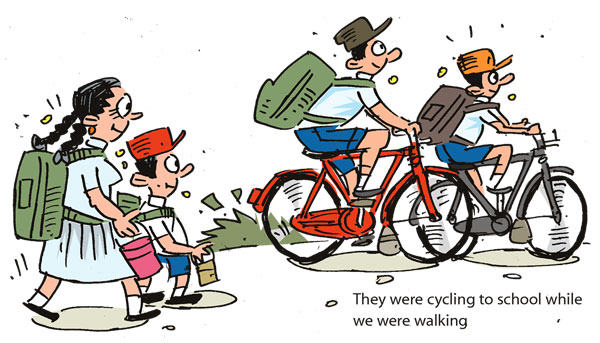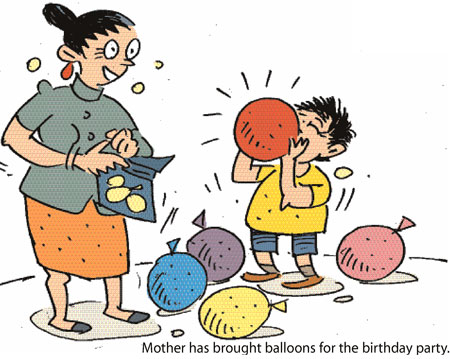|
 by R. S. Karunaratne by R. S. Karunaratne
Past progressive tense
We make the past progressive tense with 'was' or 'were' + '-ing.'
At 9 o'clock I was waiting for a train.
We were dancing till midnight.

You were reading a novel when I was watching television.
Sarath could not use the mobile phone as he was driving.
Shyama was sewing a dress when mother phoned her.
They were cycling to school while we were walking.
We use the past progressive tense to say what was happening or not
happening around a past time. We can also ask questions using the past
progressive tense.
What were you doing in the morning?
Were you watching cartoons on television?
I was not watching cartoons. I was revising my English lessons.
Statement: It was raining.
Question: Was it raining?
Statement: You were working abroad.
Question: Were you working abroad?
Statement: All the girls were singing.
Question: Were all the girls singing?
Read the following questions and responses and learn how the past
progressive tense is used.
Q: What were you playing at 8 a.m.?
A: I was playing the violin.
Q: What was Indran drinking when you saw him?
A: He was drinking coffee.
Q: What was Doreen doing in her classroom when you went there?
A: She was writing the alphabet on the whiteboard.
Q: What was Sunila doing at lunchtime?
A: She was window-shopping.
Q: What was mother doing at 9 p.m.?
A: She was cooking dinner.
Q: What were the children doing when the teacher arrived?
A: They were shouting.
Q: Where were you driving to last night?
A: To hospital.

We use the simple past tense to talk about a completed action.
However, we use the past progressive tense for actions which were not
completed at a past time.
[Activity]
Underline the correct form of the verbs in the following sentences.
Check your answers with the key.
1. I lived / was living in Malaysia for one year.
2. Mary lived / was living in India when her mother died in Canada.
3. When you phoned me in the morning I had / was having a shower.
4. The children watched / were watching the elephants all evening.
5. I watched / was watching a cartoon film when father walked in.
6. My brother worked / was working hard all his life.
7. Sanka did a part-time job while he studied / was studying in
Australia.
8. Last night we drove / were driving from Kandy to Colombo.
9. It was a bright day, so we walked / were walking home.
10. While we walked / were walking down the road, we met Ivan.
Key:
lived 2. was living 3. was having 4. watched 5. was watching 6.
worked 7. was studying 8. drove 9. walked 10. were walking
Starters :
Present perfect tense

We make the present perfect tense by using 'have' or 'has' with the
past participle of the verb. The past participle of regular verbs end in
'ed.' However, the past participle of irregular verbs have different
forms. You have to learn them.
[Examples]
The engineers have begun to construct the bridge.
Mother has brought balloons for the birthday party.
The fisherman has caught a big fish.
Somebody has stolen my car!
Jane has won a prize!
Activity:
Write affirmative or negative present perfect sentences. Check your
answers with the key.
1. I (learn) English. (Affirmative)
...........................................
2. They (eat) everything.
(Affirmative)
...........................................
3. She (forget) my name.
(Affirmative)
............................................
4. I (make) a mistake. (Affirmative)
............................................
5. She (shut) the door. (Affirmative)
.............................................
6. Amanda (work) very hard.
(Affirmative)
.............................................
7. I (hear) from Sunil.
(Negative)
.............................................
8. Jane (learn) anything. (Negative)
.............................................
9. You (break) the window!
(Affirmative)
.............................................
10. I (meet) him for ages!
(Negative)
.............................................
11. The rain (stop). (Negative)
.............................................
12. I (read) any newspaper today. (Negative)
.............................................
13. The children (come) back.
(Negative)
.............................................
14. You (hear) the news.
(Negative)
.............................................
15. Why they (bring) their children? (Negative)
.............................................
Key:
1. I have learnt English. 2. They have eaten everything. 3. She has
forgotten my name. 4. I have made a mistake. 5. She has shut the door.
6. Amanda has worked hard. 7. I haven't heard from Sunil. 8. Jane hasn't
learnt anything. 9. You have broken the window! 10. I haven't met him
for ages! 11. The rain hasn't stopped.12. I haven't read any newspaper
today. 13. The children haven't come back. 14. You haven't heard the
news. 15. Why haven't they brought their children? |

